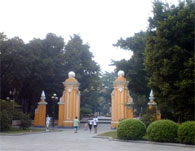The Issue

Background
China decriminalized consensual same-sex acts in 1997 and removed homosexuality from its official list of mental disorders in 2001. Despite the existence of an estimated 100,000 or more HIV positive MSM in China, biased and misinformed policing still effectively criminalizes homosexuality and hampers effective AIDS-related activism and outreach. The Guangzhou police are violating both Chinese and international law by arresting men suspected of being gay and the HIV outreach workers, and preventing them from accessing Renmin Gongyuan People's Park.
Under Chinese Law, Article 35 of the Constitution of the People's Republic of China assures all citizens the right to enjoy freedom of speech, of assembly, of association, and of demonstration. The Regulation on the Prevention and Treatment of HIV/AIDS (Decree 457) also protects the legal rights of people living with HIV, including the right to education. It directs NGOs "to participate in AIDS educational communication," and instructs local governments to "encourage and support relevant organizations and individuals to carry out educational communication, counseling and supervision on AIDS prevention and treatment to the HIV infection vulnerable groups..." The Ministry of Health specifically includes men who have sex with men among the list of vulnerable groups.
Under international law, the right to freedom of association and assembly is guaranteed under Articles 21 and 22 of the International Covenant on Civil and Political Rights, Article 5 of the Declaration on Human Rights Defenders, and Article 5 of the Convention on the Elimination of Racial Discrimination, to all of which China is a party. The International Guidelines on HIV/AIDS and Human Rights (2006) also includes men who have sex with men among groups who are disproportionately affected by HIV/AIDS and states that "[p]ublic health and an effective response to HIV are undermined by obstructing interaction and dialogue with and among such groups."
The Yogyakarta Principles on the application of international human rights law in relation to sexual orientation and gender identity, outline states' obligations to refrain from impeding "the exercise of the rights to peaceful assembly and association on grounds relating to sexual orientation or gender identity" and to "provide training and awareness-raising programmes to law enforcement authorities and other relevant officials to enable them to provide such protection."
The raids and patterns of harassment in Guangzhou discriminate against individuals by targeting them on the basis of their perceived sexual orientation. They also threaten access to the limited space that the gay and bisexual men of Guangzhou can access. Social spaces, such as public parks, are sites in which lesbian, gay, bisexual and transgender (LGBT) people build community and promote HIV education and prevention. These venues are particularly important since private space is less accessible to many Chinese gay men and lesbians, many of whom live with family and do not have the financial resources to obtain living spaces of their own.
Action
Join the International Gay and Lesbian Human Rights Commission (IGLHRC) and the Beijing Aizhixing Institute - an organization that provides HIV prevention, care and support for marginalized populations in China - in calling on the Guangzhou Public Security Bureau to respect the human rights of all park visitors, including gay men and human rights defenders providing HIV education, by allowing access to the park free from discrimination and harassment from the police and others, and by providing training to law enforcement authorities to ensure that people are not targeted on the basis of sexual orientation.
Please send your letters to:
Mr. Wu Sha
Head, Guangzhou Public Security Bureau
200 Guangzhou Qiyi (Uprising) Road
Guangzhou, China
email: xwk@vip.163.com
Please also copy:
IGLHRC: communications+action.alert@iglhrc.org
